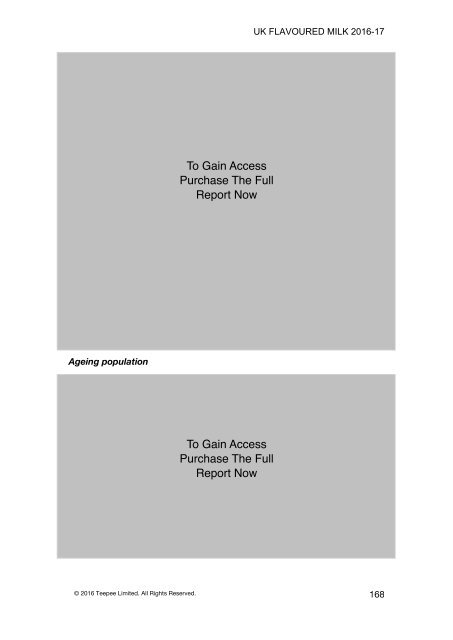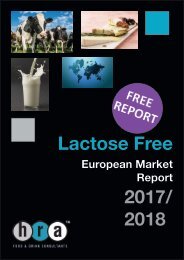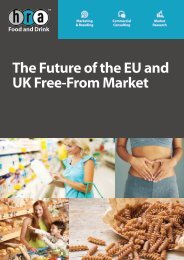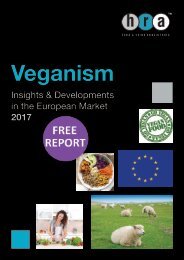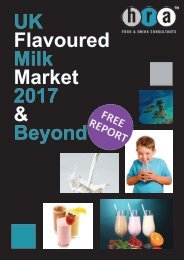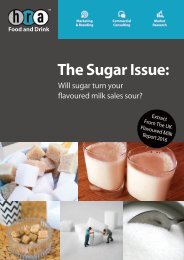FREE-UK-Flavoured-Milk-Report-2016-2017
The backdrop to the UK flavoured milk market is one of relentless change. The removal of the EU milk quotas, the transition to a Western-type diet by emerging economies, the UK sugar debate and the booming sports nutrition industry are all aspects of change that create both challenges and opportunities for the UK flavoured milk market. HRA Food and Drink Marketing has developed this report as a map to guide industry stakeholders. Although volume growth in 2014 was slightly lower than in previous years, the flavoured milk market still has plenty of room for product innovation and development. Overall, we expect the UK flavoured milk market to continue to grow over the medium term, but not without improving its nutritional profile. The sugar debate reached new heights when, in October 2015, Public Health England released a document suggesting Government intervention in the form of a sugar tax (levy). As a consequence, product reformulation has become a priority for all serious players in the market.
The backdrop to the UK flavoured milk market is one of relentless change. The removal of the EU milk quotas, the transition to a Western-type diet by emerging economies, the UK sugar debate and the booming sports nutrition industry are all aspects of change that create both challenges and
opportunities for the UK flavoured milk market.
HRA Food and Drink Marketing has developed this report as a map to guide industry stakeholders. Although volume growth in 2014 was slightly lower than in previous years, the flavoured milk market still has plenty of room for product innovation and development.
Overall, we expect the UK flavoured milk market to continue to grow over the medium term, but not without improving its nutritional profile. The sugar debate reached new heights when, in October 2015, Public Health England released a document suggesting Government intervention in the form of a sugar tax (levy). As a consequence, product reformulation has become a priority for all serious players in the market.
Create successful ePaper yourself
Turn your PDF publications into a flip-book with our unique Google optimized e-Paper software.
<strong>UK</strong>#FLAVOURED#MILK#<strong>2016</strong>217#<br />
#<br />
Surprises campaign which tries to align their low prices with farmer’s market<br />
quality.<br />
The driving factors behind local sourcing are often environmental and ethical<br />
considerations, including a desire for sustainable sourcing, reduced carbon<br />
emissions, supporting local communities, shorter supply chains with greater<br />
integrity and higher animal welfare standards.<br />
There is an opportunity for flavoured milk brands to capitalise on their British<br />
milk provenance. Daioni, with its Welsh organic milk, is a brand which does<br />
this effectively and is able To to Gain charge Access a premium for their provenance<br />
positioning. However, this opportunity Purchase is The limited Full mainly to fresh products due<br />
to the lack of <strong>UK</strong> contract manufacturing capability for UHT milk bottled<br />
<strong>Report</strong> Now<br />
drinks.<br />
In terms of whether there is a more specific opportunity for a flavoured milk<br />
product similar to the <strong>Milk</strong> for Farmers brand which promises better returns<br />
for farmers, this could be possible. In November 2015, Ash Amirahmadi, vice<br />
president of milk and member services at Arla <strong>UK</strong>, claimed that the brand is<br />
set to return £5m back to the farmers within its first year of sales. By<br />
February <strong>2016</strong>, Morrison’s claimed that the brand was surpassing its target<br />
sales. This demonstrates a clear willingness from consumers to voluntarily<br />
pay more for ethical reasons. There is little reason this could not also apply to<br />
flavoured milk. However, when milk prices start to rise again this concept will<br />
become fairly redundant. Furthermore, it has faced some criticism from those<br />
saying it is the retailers and processors responsibility to ensure their farmers<br />
are paid fairly.<br />
Ageing population<br />
With healthcare advances and consequent improvements in mortality rates,<br />
the <strong>UK</strong> population is ageing and is expected to continue to do so. Almost<br />
one in every six adults in the <strong>UK</strong> is 65 or over but by 2050 one in four will be.<br />
#<br />
The public’s perception of milk as a good supplement for the elderly<br />
population makes flavoured milk a prime opportunity to satisfy requirements<br />
for products which target their To specific Gain requirements. Access Specific relevant claims<br />
for elderly consumers include Purchase to help The maintain Full muscle mass, prevent<br />
cardiovascular disease, cognitive decline and bone and joint health.<br />
<strong>Report</strong> Now<br />
Elderly consumers have specific needs for vitamin D, vitamin K and calcium.<br />
Omega-3 is also of particular importance to older consumers as it can be<br />
protective against heart disease and can help prevent cognitive decline an<br />
improve immune function. Fortification of products with these nutrients could<br />
therefore help flavoured milk brands appeal to older consumers. Specific<br />
ingredients such as chia seeds, flaxseeds and walnuts which contain high<br />
© <strong>2016</strong> Teepee Limited. All Rights Reserved.<br />
168


